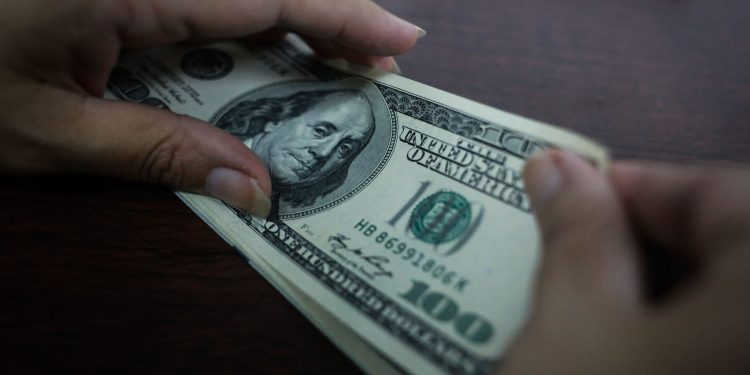The new restrictions on US dollars introduced last week by the Central Bank of Myanmar (CBM) have come as a crippling blow to businesses already struggling in an economic recession resulting from post-coup political turmoil and the COVID-19 pandemic.
The new restrictions saw the bank revoking the exemption from mandatory currency conversion given to companies with a minimum 10 per cent foreign ownership.
In April, the CBM ordered financial institutions to convert foreign currency earned by its customers into kyat within one business day at an official exchange rate of 1,850 kyats to the US dollar, as the military regime was desperate for US dollars. In June, following requests and criticisms, the bank exempted companies that are 10 per cent or more owned by overseas entities from the mandatory currency conversion.
At the same time, the bank has also ordered companies and individual borrowers to suspend repayments of foreign loans, both on the interest and the principal loan.
Companies in Myanmar have at least US$1.2 billion in outstanding dollar-denominated loans, according to Bloomberg. Those borrowers include telecom company Ooredoo Myanmar Ltd., City Square Commercial Co., a real estate firm, and telecom tower companies Apollo Towers Myanmar Ltd. and Irrawaddy Green Towers Ltd.
“There is no way we can follow its [regime’s] directives. We are completely at a loss and it is worse for foreigners. As everyone will only wait and see, all the businesses are bound to stop,” said an international freight forwarder from Yangon.
Car makers including Japan’s Suzuki and Korea’s Hyundai have recently halted production in Myanmar.
Business owners said the CBM’s capricious directives are making it difficult for them to continue their business operations, as they have little time to prepare or adapt to new directives. The majority of exporters and importers are suffering as their US dollar earnings are converted to kyats at 1,850 kyats per dollar, while they have to pay more than 2,000 kyats per dollar when they buy greenbacks from the market. As a result, many are not making new business transactions.
On Wednesday, the exchange rate hit more than 2,400 kyats per dollar. But, again, in the dollar market, the demand is high and the supply is low.
“It is better not to do anything, but you will make a loss when you do [a business transaction]. There is no hope of doing business here, not anymore,” said an agricultural produce exporter.
Dollar Crisis
The value of the Kyat declined after the Myanmar military staged a coup in February last year, and it plunged again after the regime limited cash withdrawals from banks and ATMs, and has continued to slide amid political instability and a general economic downturn.
The exchange rate weakened to more than 2,000 kyats per US dollar around July last year when Myanmar had to import large volume of medicines and medical oxygen amid the deadly third wave of COVID-19, despite the fact that the CBM had been selling millions of US dollars.
In August, the CBM re-introduced a fixed exchange rate, replacing the managed floating exchange rate. The move remedied nothing, except that the exchange rate further slumped the following month to more than 2,700 kyats per dollar in the open market.
The regime gave up selling US dollars in March 2022 by which time the CBM had sold more than US$530 million.
On April 3, the CBM ordered that foreign currency earned by locals must be converted into local currency at the official exchange rate within one working day.
Moreover, the regime has limited imports of fuel, cooking oil, pharmaceuticals and other items deemed as luxuries in a bid to prevent the outflow of US dollars. It has also imposed restrictions on export and import licenses.
The regime’s efforts to seize US dollars do not stop there. Earlier this month, the junta reversed its position on allowing the use of the yuan and baht for trade along the borders with China and Thailand, ordering transactions be made in US dollars through banks.
All these moves indicate that the regime is desperate to preserve the country’s declining foreign currency reserves.
“[The regime] is desperate to find US dollars. It apparently lacks long-term planning. If this continues, no new foreign investments will come into the country. And existing foreign investments will leave the country. So the economy will slump further,” said an economist.
The regime is controlling US dollars partly because it needs the greenbacks for its military expenditures as it struggles to contain nationwide armed resistance to the junta, he added.
With its ground forces performing poorly, the junta has to rely heavily on aerial attacks in fighting resistance forces and ethnic armed organizations. Aviation fuel, the basic necessity to operate helicopter gunships and jet fighters, has to be imported with US dollars.
Possible Bankruptcy
The regime has ordered companies and individual borrowers to suspend repayments of foreign loans, but it did not clarify for how long the order will be in force for.
Many foreign firms have already ditched their operations in Myanmar since the coup amid international pressure not to do business with the military regime. But it appears that many more firms will be likely to be forced to leave Myanmar because they are no longer commercially viable in the current business environment.
It is also possible that the regime is intentionally creating the economic crisis. Recent developments suggest that the regime is returning to an economy closed to the outside world, like its predecessors. It appears that the regime and its cronies are trying to monopolize the economy.
The US dollar shortage will lead to a decline in imports of fuel, cooking oil and pharmaceuticals. Their stocks are already running low and prices for them have soared.
The economist said: “It is fair to say that the suspension of foreign loan repayments is a pre-stage for bankruptcy. If the crisis worsens, Myanmar will be bankrupt.”
There are previous examples of governments being toppled by economic crises resulting from mismanagement and corruption. The case of Sri Lanka, which has recently declared bankruptcy, is the most recent example.

















